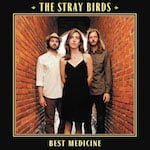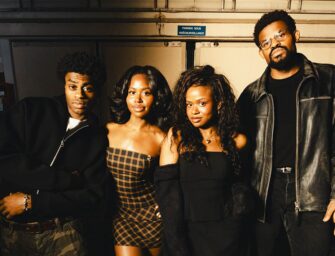
The Stray Birds: contemporary Americana at its finest
Songwriting goes to Cambridge and meets a young American band who are steeped in the most venerable of folk traditions
Americana band The Stray Birds have been flying high this year, with successful tours of the UK and Europe including appearances at the Cambridge Folk Festival and the Tonder Festival in Denmark. Known for their songwriting, instrumental virtuosity and bluegrass-inspired three-part harmony singing, their new album Best Medicine has proved a surprise hit.
The band is made up of multi-instrumentalists and vocalists Maya de Vitry, Oliver Craven, and Charlie Muench – all originally from from Lancaster, Pennsylvania. All three are classically-trained musicians who’ve been making music of all kinds since childhood – with Oliver Craven playing first in the Craven Family Band – and all were raised on a steady diet of music ranging from pioneers like The Carter Family and Bill Monroe & His Blue Grass Boys to The Beatles and Jimi Hendrix.
The trio recorded their first self-titled album in 2012, which won critical acclaim: NPR included it on their 10 Best Folk/Americana Albums of the Year list and several songs from the project were in heavy rotation on radio stations like WXPN. Songwriting was lucky enough to catch up with the main songsmiths of the band Maya de Vitry and Oliver Craven at this year’s Cambridge Folk Festival.
 You’re clearly a band steeped in the bluegrass tradition – how important was music to you when you were growing up?
You’re clearly a band steeped in the bluegrass tradition – how important was music to you when you were growing up?
Oliver: “I grew up playing music with the Craven Family Band – my dad’s a songwriter. This instrumentation of the Stray Birds is not too dissimilar to that.”
Maya: “In my family it was the way we hung out. My folks would call friends out and we’d have a campfire in a field and people would sing songs.”
Tell us a bit about your writing process… do you always have notebook with you?
M: “I have two notebooks right here, I’ve got a big one and a little one. Sometimes the words and music come together, but if one is going to come first it’s usually the words.”
O: “I’m the opposite. I always have the melody and the rhythm, and then I try to squeeze words into it.”
M: “That’s why we can write well together!”
“It’s difficult to co-write for me, because it is my spirituality, my prayer”
What are your views on co-writing? I know you’ve written a number of songs together…
O: “We’ve been co-writing a lot lately, actually.”
M: “That‘s because we’ve just moved to Nashville. Everyone co-writes there.”
O: “I think any time you finish a song, regardless of how you got to that point it feels like a success. When a song is done, that is the point.
“It’s difficult to co-write for me, because a reverence with what I do. It is my spirituality, my prayer. To invite someone into that is delicate thing to do and you can really ruin something if you invite the wrong person. But when it does happen and does work, then the more the merrier. If you can find the right connection then maybe it becomes more powerful.”
M: “That’s the best explanation of co-writing I’ve ever heard!”

The Stray Birds: waiting for a train
Both of you have written political songs, such as The Bells and The News. What’s your feeling on those type of songs?
O: “I’m interested in contributing to actual society and planet earth; unfortunately you can’t not involve politics in that. We have feelings about things that are very powerful that inspired us to write things in the first place.”
M: “If people aren’t interested in it, that’s not our problem.”
“I love that people are standing and listening to folk music”
How have found the Cambridge Folk Festival?
M: “I’m loving it. It’s crazy. I love that people are standing and listening to folk music. The majority of people are standing and are so physically engaged.”
Your new album Best Medicine opens with the title track, which beautifully evokes the life of record shop and a love of music, and you’ve also filmed a great video for it. Can you tell us a bit about the song?
M: “A man called Kurt has a small shop filled with old vinyl and books in Schenectady in New York. It’s in the video. That’s the place that inspired it. Ambition café is across the street, which is also in the song in the words: ‘A town with ambition up its sleeve’. It was generally run-down. Towns have a boom, then major factories and major industry, and then it goes somewhere else.
“Kurt was telling me he broke his hip on Main Street last year. He’s had a tough life. He had wanted to be a music teacher but that dream was never realised. But he’s still connected to his town, making do and telling stories. This is his life contained in this tiny record shop. That was what the video was about.”

The Stray Birds go vinyl-hunting
Another gorgeous song from the album is Feathers And Bone. What inspired that song?
O: “It was just the music. I was writing it in different way to way it is on the record. It was inspired by a good friend of ours, folk singer-songwriter Ana Egge. We were in the studio and wanted to record it but it wasn’t done and I took it to Maya, and she and I finished it off. She understood the meaning of the song – we both have an appreciation for Ana.
“It has a lot of meaning to me. We don’t play it a ton. It also has a lot of spirituality about it. It’s something about the difference between feathers and bone.”
M: “One of the things I connect to in the lyrics is this idea of people who are creative even with seemingly mundane tasks. We have stonemason friend who hides designs. It’s about drawing a window in the sand.”
“There are always many channels coming in when I’m writing”
Your track Never For Nothing has a wonderful chorus that I keep humming in my head. Can you tell me a bit about that song?
M: “The words ‘never for nothing’ came directly from a sign hanging on the door of a falling-down boathouse at Peck Lake in upstate New York. I was kayaking and saw the words, and I had some of the other words of the song in poem form.
“There are always many different channels coming in when I’m writing a song. There’s this song called Stray Birds that our friend Rose Cousins wrote, and she repeats ‘Oh I have turned’; in this song we repeat ‘Oh I have lost’, but it’s more embedded. As I was finishing the song, I sent it to her and said, ‘I wouldn’t have written it that way without you writing Stray Birds’, which in turn was inspired by meeting our band. Our songs aren’t standing alone – they’re conversations. That’s the value of writing a song like someone else. It’s about mutual respect and admiration.”
O: “I’d kind of like to start writing songs which are just more fun, cos lyrics really move me, but I kind of want to write songs that people can bounce along to, too.”
Interview: Nic Rigby (@nicrigby1)
Nic is part of Norwich band Emperor Norton – @emperornorton1 on Twitter – and organiser of Uke East Music Festival.
To keep up with all things Stray Birds-related, visit their official website.


































Related Articles